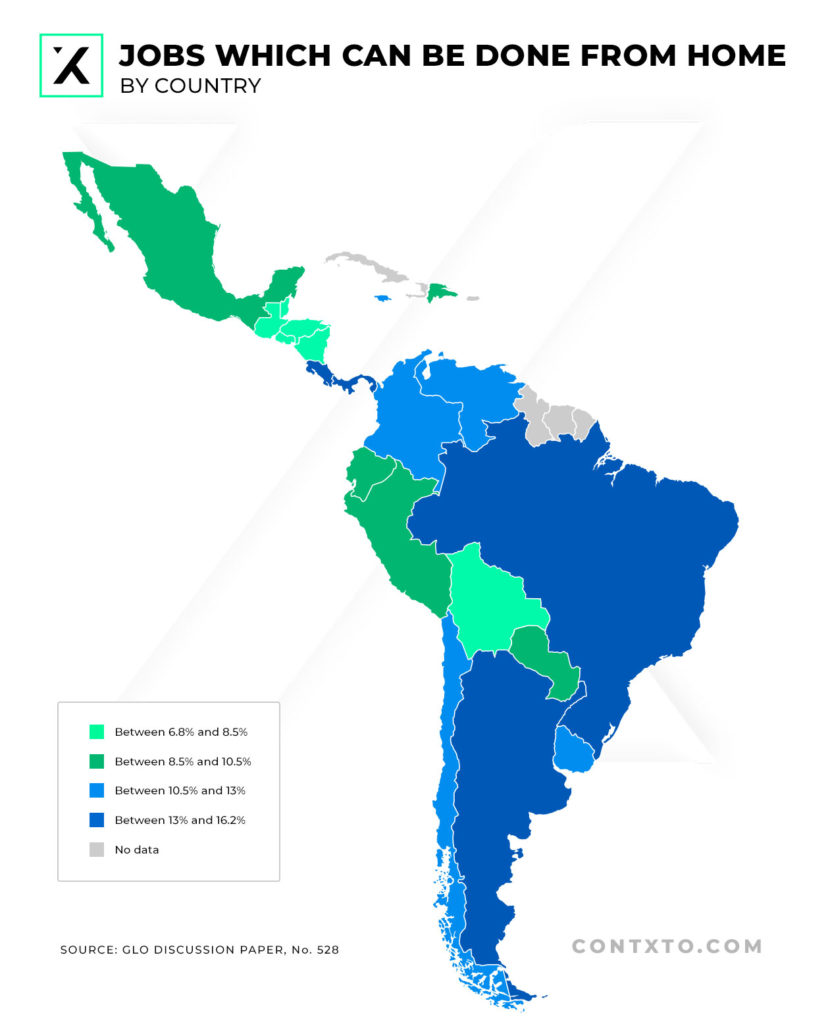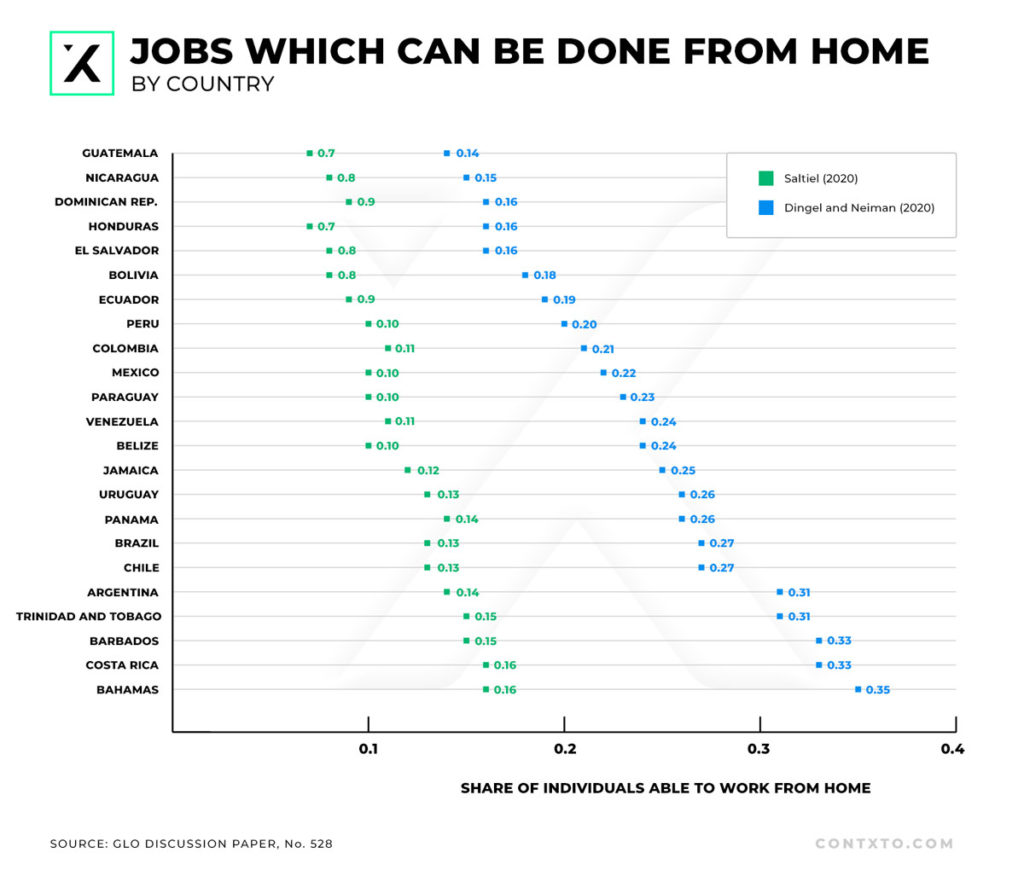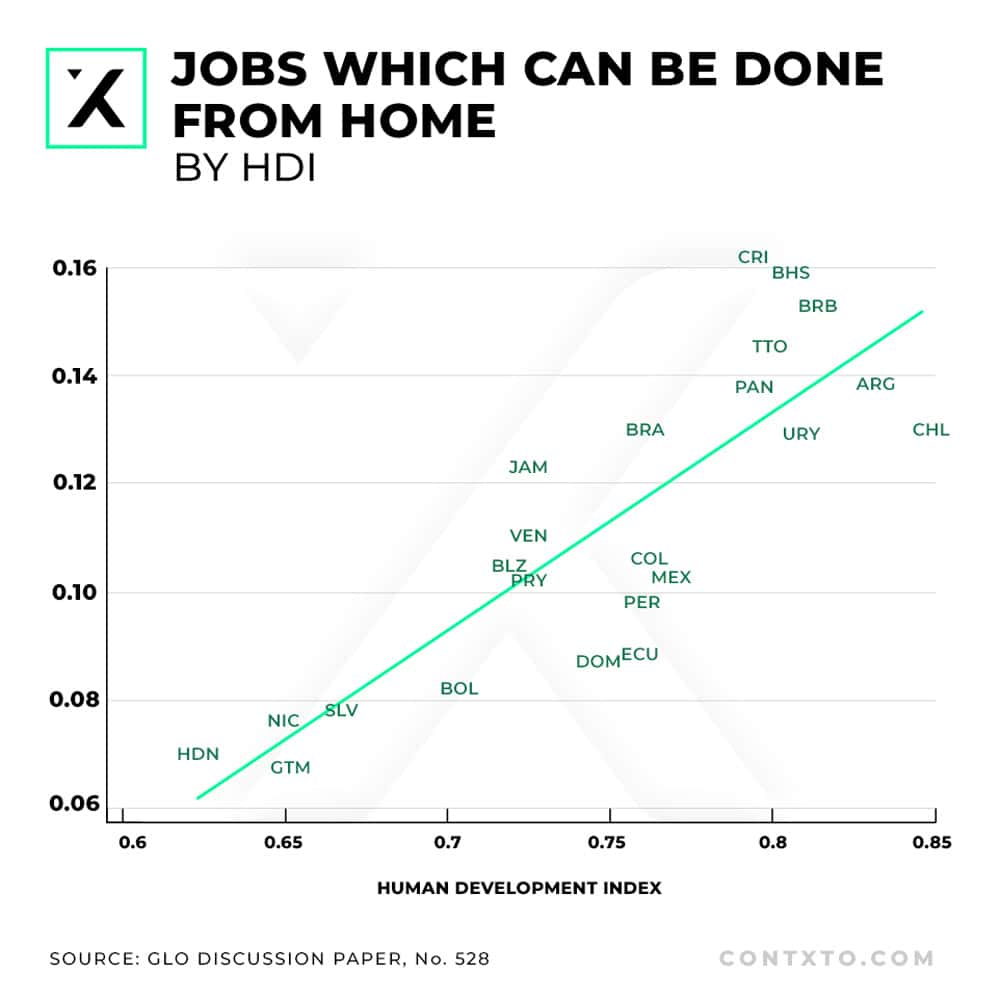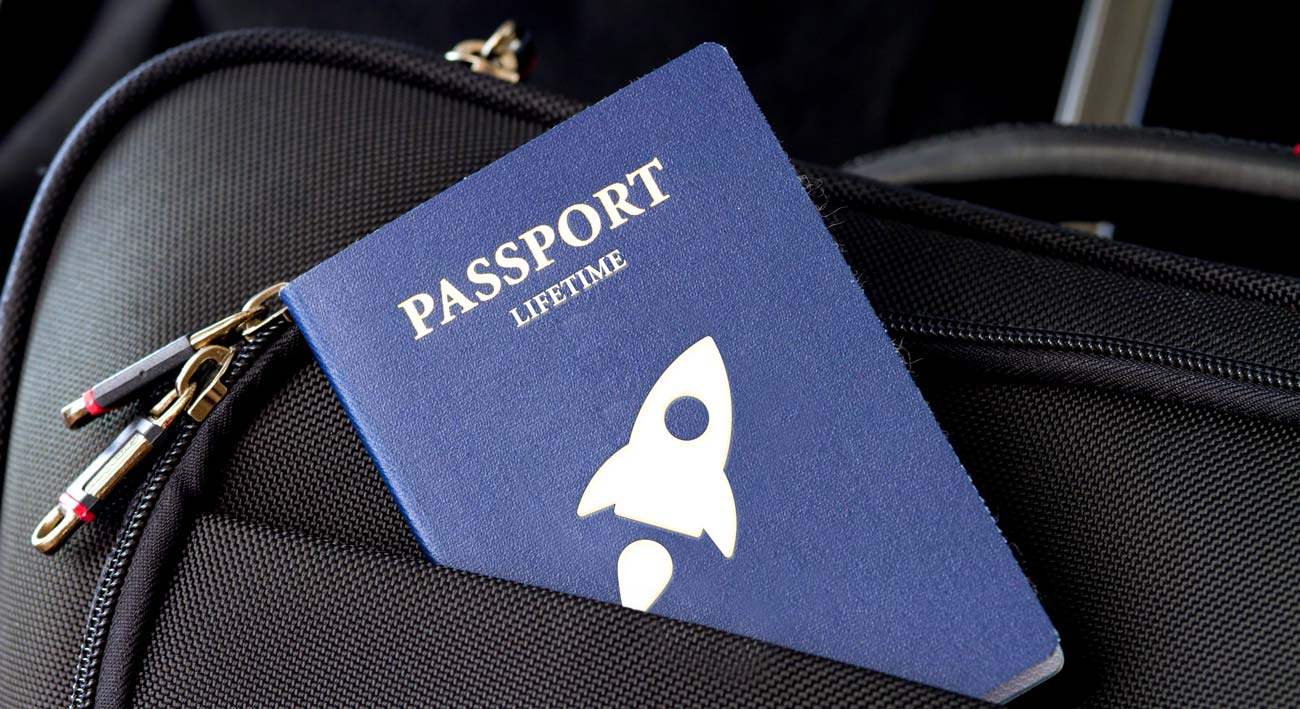Welcome to our new The Exclusive deep dive content about our Latin American ecosystem. We’re giving our registered newsletter users a sneak-peek of these soon-to-be paid for articles.
(function() { var qs,js,q,s,d=document, gi=d.getElementById, ce=d.createElement, gt=d.getElementsByTagName, id=”typef_orm”, b=”https://embed.typeform.com/”; if(!gi.call(d,id)) { js=ce.call(d,”script”); js.id=id; js.src=b+”embed.js”; q=gt.call(d,”script”)[0]; q.parentNode.insertBefore(js,q) } })()
Contxto – Covid-19 crippled an entire industry in a way no Trump tweet or Kylie Jenner Insta-story could’ve ever done.
There are now two broad points of view regarding the future of the travel industry. One says that travel is essentially screwed for good, and the other believes that travel is trading at a massive discount.
Many do not believe we’ll ever go back to previous levels of movement. Could this be the end of travel as we know it? I believe so. But the clue is in the phrasing: “as we know it.” You see, I do not believe that this is the end of travel by any means. It’s just going to be of a different kind.
Being in Silicon Valley was an important driver if you wanted to network your way into the tech industry, as much as being in Wall Street helped you get into finance by meeting and brunching with bankers. Same goes for entertainment in LA and politics in Washington.
But, what’s the point of even being there when the people you’re there to network with are going to meet you over Zoom?
This month, blogs declared the “death” of New York City, and even saw Medium posts and Twitter threads on “Five Reasons Why I’m Moving Out Of The Bay Area.” Some Twitter users even decided to jump ahead and leave their cities without even knowing where to go next. Bold move.
Or maybe, not that bold. Maybe it’s something that had been crossing people’s minds, and they just needed a light nudge—something like a global pandemic—to take the leap. Clearly, there’s a trend to be detected and carefully analyzed here.
A lifelong industry
The global travel industry hit record highs back in 2018. According to the World Tourism Organization, 2018’s market for travel reached US$1.7 trillion, or 2 percent of the global GDP.
Fast forward two years and airline seat capacity has dropped 31 percent on a year on year (YoY) basis in Mexico alone. 44 percent YoY in Brazil.
Also in Mexico, search intent to buy plane tickets or accommodation—measured in search queries—dropped by 40 percent in the first half of 2020.
The region’s industry as a whole, including OTAs (online travel agencies), accommodation, and transportation, suffered losses ranging from 40 percent to 63 percent in the first half of 2020.
For instance, Despegar, reported a US$57 million loss in its last quarter, resulting from a 96 percent drop from gross bookings. Ouch.
Nevertheless, as much pain as it’s been going through, Despegar just raised US$200 million in a private stock transaction with private equity funds L Catterton and Maha Capital. Not to imply that these funds are the oracle, but they, too, may be betting on a discounted industry.
On top of that, and despite its Best Day Travel deal being paused, Despegar recently acquired Koin. The Brazilian startup will help Despegar users pay in monthly instalments, rather than upfront payments. Easing out users’ wallets by spreading out cash disbursements is a smart move. Perhaps even a trend.
So, yes, travel received a massive blow, but don’t jump to conclusions just yet. The industry may be able to take more punches than Rocky Balboa.
The industry can change, but the desire to travel remains… in our genes?
A couple of years ago a viral trend popped up across social and traditional media. Apparently, there was now “scientific proof for wanderlust.”
More than a few outlets claimed that some people had a predisposition for travel and that their genes justified their impulse for continuous curiosity.
Upon quite a bit of research, I could not find a single serious research paper explicitly saying there was a “travel gene”. This paper was the best I could find.
According to its abstract, DRD4—a dopamine-regulator gene—and DRD4-7R—a variant of the same gene—are usually found in people with lower dopamine sensitivity.
This genetic quirk translates into a personality trait. One that is constantly seeking out experiences that release more of this neurotransmitter; the supposed correlation with novelty-seeking. It is loosely quoted to be one of the psychological causes behind human migration, even in ancient times.
Now, I don’t plan to go deep into the neurological details, but speculation about a human predisposition to travel abounds.
In fact, no other species in the world has settled in as many regions as humans have. And despite loosely tied correlations, you yourself probably know people who just can’t stop traveling. For some, it seems to be innate.
It is not for everyone, but the fact remains that there are surely enough people with itchy-feet to make the scenario I am about to describe a wide-spread trend.
Travel-changing trends
Latin America has two clear advantages when it comes to the rise of this new redistribution of travel.
As US citizens and Europeans start moving out of their cities and across their own country and the globe, Latin America could become a go-to destination because of its cost of living and exceptional weather.
It can be argued that foreign currency income is the main goal of tourist destinations, more so than domestic travelers’. In a remote work world, the line between one and the other will be increasingly blurred.
As I discuss with Alexander Torrenegra in one of our most recent Futurismo episodes. We are experiencing massive changes sooner than later.
That and the following trends, are the reasons why travel will prosper and gain ground in the years to come:
Decentralized travel
Think about it. Previously, there was a specific time for large crowds of people to concentrate in specific places. Think, Christmas holidays at Disneyland. But nowadays, work and vacations are increasingly asynchronous and decentralized.
Decentralization of travel means the industry will grow horizontally. It also means that we’ll see an increased fragmentation of the market.
Big hotel chains and a small proportion of destination cities, the ones that used to take most of tourist revenue, will struggle. By contrast, we’ll see individual hosts and boutique hotels in small towns compete for those same consumers.
No more crowded swimming pools and packed theme parks. I believe we’ll start seeing more outdoor adventures and small intimate experiences.

Small is beautiful
As Oyo Room’s CEO, Mandar Vaidya, said to KrASIA, “the budget hotel segment will recover quicker than the premium and luxury segment, as people have less disposable income.”
Mandar also believes that there is an inertial force of consumers from both business and leisure activities that are eagerly building up demand for these services.
He thinks that, once lockdowns are lifted and “travel patterns normalize,” these consumers will bring back growth to the industry. I don’t fully agree with his “travel normalization” statement, but I do believe that demand will increase, as mandatory regulations are lifted.
In Latin America, Oyo’s copycat, Ayenda Rooms, is helping standardize decentralized travel. Low visibility, low budget, boutique hotels are now able to increase revenue due to Ayenda’s platform.
Not only that but the standardization of services reassure hygiene-skeptic travelers.
Furthermore, branding and familiarity—whether you consider those competitive advantages or not—are definitely drivers of trust for consumers. The fact is that travelers know Ayenda; they know their practices remain the same whichever location of theirs they visit.
Airbnb, the decentralized hospitality platform par excellence, is the perfect tool for lowkey destinations. Along with Ayenda, people can now visit small towns, outdoor experiences and less crowded places by enabling people to rent their own accommodation without hotel chains having to build something for people to visit.
Now, a small surfer beach in Puerto Vallarta, Mexico, can enjoy tourist spending without the touristic investment it previously required.
In summary, decentralized, intimate, and individual accommodation and experiences will become increasingly common, in contrast to concentrated holiday destinations.
Nomadic lifestyle
Even before Covid-19, 8 million people in the US were already “remote workers”, accounting for 5.2 percent of the population. Over the last five years the trend grew up by 44 percent. And it will continue to grow at an exponential rate.
While it is clear that not every role and job can be performed remotely, a recent paper, “How many jobs can be done at home?”, found that 37 percent of the US workforce could perform their jobs remotely.
Another paper, “Working From Home Under Covid-19: Who is affected? Evidence from Latin American and Caribbean Countries”, suggests that there is a degree of variability depending on methodology to conduct analysis and several other variables.
For instance, using the same methodology cited in the US-based “How many jobs can be done at home?”, data reveals that 14 to 35 percent of Latin American employees could perform teleworking, depending on the country.
Nevertheless, using another methodology—known as the Saltiel Index—only 7 to 16 percent of the Latin American population could actually work from home; Guatemala and Honduras being the lowest data points and Bahamas being the highest.

Wealth begets wanderlust
The paper also concludes that there’s a positive correlation between higher-earning and higher-skilled occupations and the capacity to work from home. Honestly, no surprise there.
However, there’s a discrepancy between high-earning jobs’ capacity to work from home contrasting two different countries.
For example, the paper mentions that 55 percent of Brazilian managers are able to work from home, while in Paraguay, only 13 percent of people in management positions would be able to do so.
Interestingly enough, though the research is fresh out of the oven (2020), some of these surveys were made more than 10 years ago. Thus, there is a good case to say that some work-from-home trends displayed on the paper could be even greater than the data suggests.
Considering Latin America’s job market is focused on physical labor, the rate of remote work growth is definitely going to be slower or even capped at a much lower number than that of the US.
Nevertheless, the office jobs and companies that can implement remote work, will.

The rise of the co-company
Remote work-powered travel will then increase, boosted also by the flexibility of travel and accommodation arrangements popping out worldwide. And you do not have to take my word, better take a look at Panama’s Selina.
The co-working and co-living chain aren’t only “getting through” the pandemic, in fact, they are still growing.
Just this month Selina expanded to Athens by officially inaugurating its first hotel in Greece. It also launched its third building in the UK, this now operating in Birmingham, Manchester, and soon, London.
“When we opened our first Selina, we were already thinking about the future of work,” said Rafi Museri, Selina’s co-founder and CEO.
“We always knew the future would mean more remote work, with people perhaps choosing to live in cheaper countries in order to afford a more experiential, travel-oriented lifestyle. And I think the coronavirus has really just sped up this existing trend.”
Now, Selina is launching a subscription service for digital nomads across the globe, essentially betting on population redistribution. Why?
People will leave big cities where the only reason to stay is jobs and networks. Nowadays, social media and online communities are good proof that networks needn’t be tied to physical location anymore.
As the future of work becomes increasingly decentralized and digital, it is likely that more people will move abroad to places with a lower cost of living.
Selina’s newest products, Nomad Passport and CoLive, include monthly subscription services ranging from US$180 to US$2,000. Imagine that, all-inclusive packages at tropical locations for a fraction of the cost of living in Seattle or New York.
With the same framework in mind, Selina launched B2B Remote Work Pass, which enables employers to purchase co-living and co-working spaces for their remote employees.
So, not only can rent be an employer’s perk from now on, but it could also be more affordable than paying for a US$80 per-square-foot office in San Francisco.
If people can now live on “permanent vacation”, geographically-speaking; time and space are no longer constraints.
You could be in Mexico today, fly to Colombia the next, and the work dynamic will remain the same.
Mexican startup Guru De Viaje, which enables users to find cheaper than normal flights, could become a valuable tool for the permanent nomads out there. The ones seeking to escape routine and move around to unexpected places at unexpected times.
Local tourism
Air travel is indeed suffering at the moment. Recovery depends on new, more hygienic practices to be adopted, not only by airlines and airports, but also by travelers themselves.
However, airtravel won’t just disappear, yet local tourism will most likely predominate.
Startups and companies providing weekend rural escapades may outperform those offering big city hospitality and services. Remember, pandemics do not eliminate human desire for leisure and exploration.
Local Adventures, Jubel, Wheel The World, and Awake Travel are some of those companies providing services to outdoor enthusiasts.
Tech-empowered hospitality companies
Hospitality and travel companies themselves will have to up their game if they want to survive and thrive. Tools that help these businesses cut costs, optimize resources, and increase sales will become increasingly valuable to the struggling business owners.
While travel was mostly a passive, inbound-led cyclic business, with relatively predictable revenue trends, it will now become an outbound driven business model.
Companies will have to target and sell themselves throughout the year. And not just during specific vacation seasons anymore. They can no longer expect consumers to come to them; they’ll have to hunt them down.
Guru Hotel
Guru Hotel, for instance, helps independent hotel owners and managers get the most out of technology. It allows them to create websites in minutes, specifically tailored to the hospitality industry needs. This means that they can integrate the necessary applications and APIs seamlessly. Indeed, tech shouldn’t be a cost but an investment.
GetABed
GetABed also provides web services for hotels. The company is empowering hotels to take control of their marketing and acquisition funnel instead of blindingly relying on OTAs alone.
Their website reads, “out of all the guests that you acquired through an OTA, 70 percent visited your site before purchasing. With GetABed, you’ll be able to retain and convert that traffic immediately.” Here you’ve got a tool that wants to diminish the cost of goods sold and increase margins.
Travl Join
Travl Join delivers insights and intelligence on leads and traveler behavior patterns for companies. It uses machine learning to “find unfindable travelers across the web”.
They do this by understanding a traveler’s destination, desire, and interests. With tools like Travl Join, hospitality and travel brands can understand their markets’ dynamics on a macro level as well as acquire and convert users on an individual basis.
All long tools that give back power to service providers.
Moonshot: Uber for planes
Imagine a future where consumers can “rent” airplanes complete with a pilot; an Uber for air travel. This is already happening.

I know, right?
Uber’s Elevate is creating low cost, shared air vehicles, but mostly for in-city travel. A multinational airline for individual planes could be the next step for air travel?
Now, not only are companies such as BlackBird and Surf Air, betting on private travel. In Latin America, Flapz, a Colombian platform, is aiming to create a marketplace for travelers and private plane owners/pilots.
At this point in time, the very idea of this raises too many questions, perhaps even a few laughs here and there.
How much will they be able to charge to cover costs and make it sustainable and profitable? How many customers will be able to afford that price tag? Are there even enough pilots and owners to make this a reliable service?
Flapz is still in its infancy, but we have some reference prices from its US equivalent Surf Air and BlackBird. Surf Air offers memberships which start at US$1,900 a month, or on demand bookings which are charged by the hour and vary depending on distances and charter model.
This is one of the moonshots that I love to cover. We’ll dive deeper into this company in the foreseeable future.
TaaS: Travel as a service
It is clear that the “as a service” suffix was already a popular one.
Travel was one of the industries that had not taken full advantage of memberships compared to other traditional industries. I believe that recurrent, predictable revenue could help travel and hospitality companies such as Selina and Flapz cover some of the high variable costs.
It is safe to say that someone would be able to live off of Selina and Flapz subscriptions for less than renting a house and owning a car.
In fact, I am starting to consider a change of lifestyle, too.
-VC





